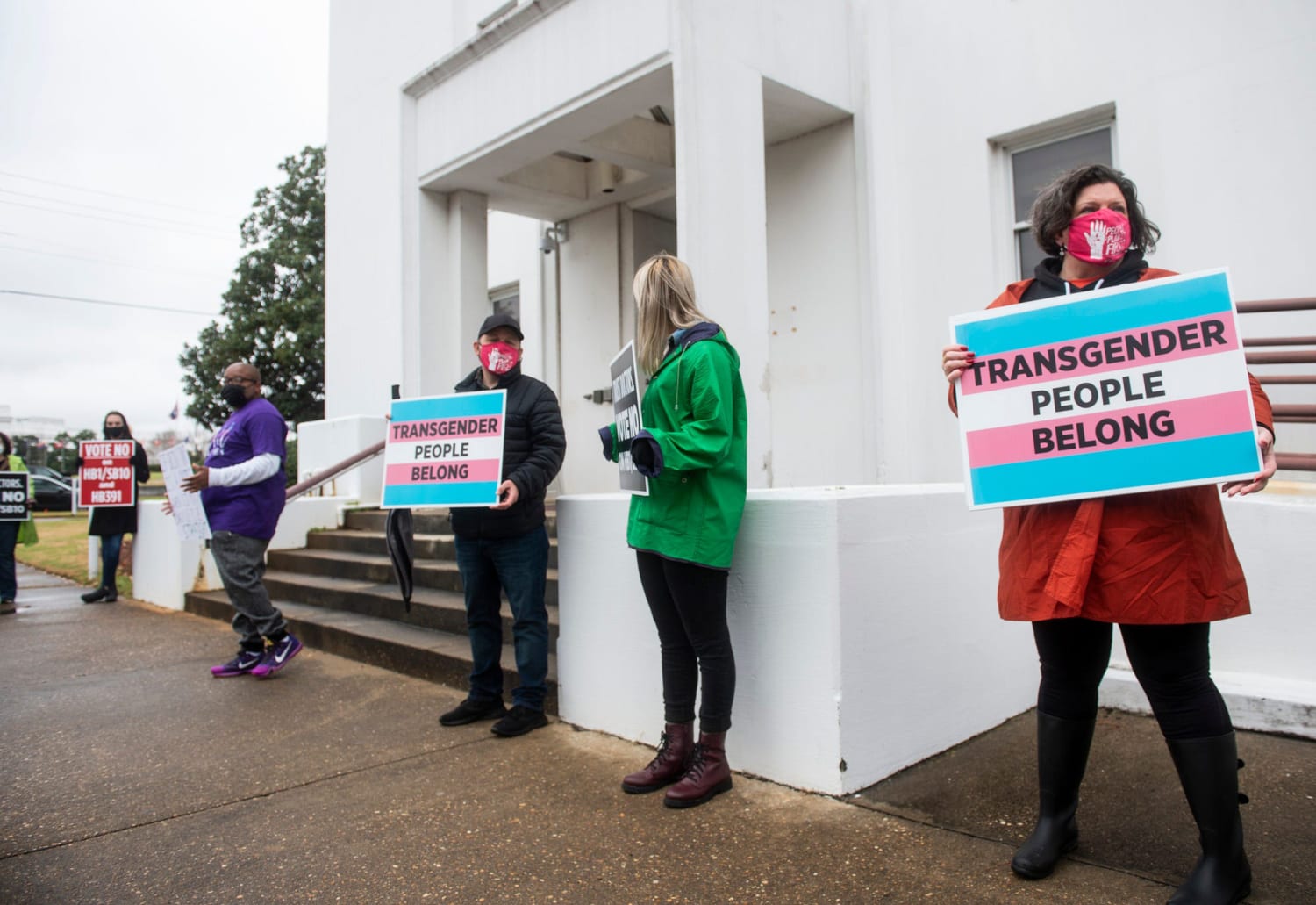Zuriel Hooks, who lives in Montgomery, Alabama, started receiving hormones when she was 17 years old. She said getting gender-affirming medical care helped her look forward to the future.
“This is something I know I need in my life,” Hooks, now 19, said. “It really helped shape who I am as a person. It makes me keep going in life. For that to be taken away from me, I can’t describe the feeling, because it’s just horrible.”
A bill being considered by the state Legislature could bar minors — or those 18 and under — from having access to transition-related health care as Hooks did.

The Vulnerable Child Compassion and Protection Act states that sex is something that “cannot be changed” and describes transition-related care as “experimental.” It would bar medical professionals and parents from providing gender-affirming medical care for transgender people younger than 19, and it would carry a felony criminal penalty, which could include a prison sentence of up to 10 years and/or a fine up to $15,000.
In Senate debate this month, the bill’s primary sponsor, Shay Shelnutt, a Republican, said he disagrees with the medical definition of gender dysphoria — which is a conflict between a person’s assigned sex at birth and their gender identity — and said his definition is “someone thinks they should be a girl if they’re a boy or thinks they should be a boy if they’re a girl.” He said the bill seeks to “protect our children” and “stop these surgeries and these drugs on our children.”
The Senate approved the measure March 1, and it now heads to the House, where it’s expected to pass, although it’s unclear when the House might consider it. If the House passes the bill, it will go to Republican Gov. Kay Ivey for a signature.
Ivey hasn’t taken a public stance on the bill. Last year she signed a measure that bars transgender girls and women from playing on female school sports teams. If she does sign the new bill, Alabama would become the third state to have enacted restrictions on gender-affirming care for minors, along with Arkansas, where a judge blocked a similar measure from taking effect in July, and Tennessee, which passed a measure last year barring very young minors from receiving such care.
The restrictions in Alabama, Arkansas and Tennessee are part of a national trend over the past several years of states’ shifting their focus from limiting gay rights to limiting trans rights. The number of bills to restrict gender-affirming health care for transgender youths has grown from one in 2018 to 36 this year, according to an analysis by NBC News. Bills seeking to limit transgender sports participation have grown from zero in 2018 to 58 this year.
Advocates say the bills are based on disinformation about gender-affirming medical care, which is supported by all relevant accredited medical associations, and that they are being used as a wedge issue by Republicans to drive conservative voters to the polls. In Texas, for example, Attorney General Ken Paxton and Gov. Greg Abbott directed the state child protective services agency to investigate the parents of transgender minors for child abuse if it appeared the minors were receiving medical care such as puberty blockers or hormones — two weeks ahead of the Republican primary election earlier this month. A judge issued a temporary injunction against the investigations this month, which Paxton appealed. An appeals court reinstated the injunction Monday.
Hooks said the question she and other trans people in her community have for lawmakers is “Why?”
“The fact that they didn’t even ask us how we feel is very inhumane,” she said. “They’re making the decision because they want to, so it’s very terrifying.”
Hooks is an ambassador for the Knights and Orchids Society, a group led by Black trans people in Selma, Alabama, that provides free health and wellness services to the Black LGBTQ community. She’s also one of the group’s clients who receives gender-affirming medical care.
Quentin Bell, the group’s executive director, said that “for us, the number of clients that this would directly impact doesn’t even begin to tell the story of how deeply it would affect them individually, and it would be for a duration of time that would be beyond our control if it has to go to court.”
One of the group’s clients who is 15 wants to start puberty blockers, but “even though their guardian is on board, if this passes, they definitely wouldn’t be the only minor that we work with who would be affected by this decision,” he said.
He said most of the group’s clients can’t stay in the know about anti-trans bills, “because they’re just trying to survive on a day-to-day basis.” The legislation also moves quickly. Outside Alabama, anti-trans bills have advanced in more than a dozen other states in the last month.
“If anything, they know that, no matter what, we’re going to do our job,” Bell said of the group’s clients. “We’re going to keep providing essential services to them, our physicians and medical care providers are going to do all that they can, our community partners are going to speak up, and our supporters are going to fight for them every step of the way.”
The few doctors in the state who provide gender-affirming care to minors are also preparing for the bill’s potential effects.
Dr. Morissa Ladinsky, an associate professor of pediatrics at the University of Alabama at Birmingham and a co-lead of UAB Pediatrics’ gender health team, said her team is the only one of its kind in Alabama, Mississippi or the Florida Panhandle. It serves patients in those three states, as well as patients who travel from Georgia and Tennessee.
If the bill is signed into law, she said, it could affect about 150 of her patients. Its true impact, however, would be even more widespread, she added.
“The youth who would truly be affected by this bill if it were to become law, and the ones that keep me awake at night, are the youth I have not yet met,” she said. “The ones who are still finding the name, the term, for who they are and where their identity is growing. And for those youth, the ones who I’ve never met, when you take away hope that they can live the truth that they’re just beginning to understand, you really take away health.”
She said her team told emergency rooms across the state to be “on high alert,” because she expects suicide attempts by trans youths could increase in the coming weeks if the bill progresses.
She said doctors in other states have seen it happen already. Last year, Arkansas Gov. Asa Hutchinson vetoed a bill to ban gender-affirming care for trans minors after he spoke to trans people in the state. But the Legislature overrode his veto.
In the seven days after the Legislature overrode Hutchinson’s veto, Ladinsky said five youths who had been receiving gender-affirming care at Arkansas Children’s Hospital in Little Rock showed up in the hospital’s emergency department after they attempted suicide.
“This is not hypothetical,” she said. “Just look at Arkansas.”
Supporters of the bill say gender-affirming care is experimental and that transgender youths often grow to align their gender identities with their sexes assigned at birth over time.
“Science shows that children that are going through this gender dysphoria, most of them mature or grow out of this stage if they are given the chance,” said Shelnutt, the bill’s sponsor. “So why is [this bill] needed? It’s just to stop these surgeries and these drugs on our children. It’s to protect our children. That’s my simple explanation.”
But Ladinsky said Shelnutt is misusing medical research.
Youths who haven’t yet entered puberty may grow to identify with their assigned sexes at birth, she said, but these prepubescent youths aren’t receiving any medical interventions. The bill, she added, would bar care for trans and gender-diverse youths in puberty and older, who are very unlikely to ever identify with their birth sexes.
“The people that write these bills and the legislators that sponsor these bills are not physicians,” she said. “They’re completely ignorant regarding peer-reviewed evidence-based data.”
Ladinsky said she expects a court to stop Alabama’s bill from taking effect should Ivey sign it into law. The American Civil Liberties Union and the National Center for Lesbian Rights are both preparing legal challenges to it, The Daily Beast reported.
Advocates hope that fear of expensive legal challenges will deter Alabama House members from supporting the bill. The U.S. Department of Health and Human Services also recently issued a memorandum in response to Texas’ investigations into the parents of trans youths, saying that refusing to provide gender-affirming care to someone because they are transgender would violate the nondiscrimination clause of the Affordable Care Act and could jeopardize a state’s Medicaid funding.
For now, Ladinsky and groups like the Knights and Orchids Society are telling trans youths in the state that they won’t stop fighting for them.
Hooks said the only way she can describe how she felt after the Knights and Orchids Society helped her get access to hormone therapy is like “an inner glow.” She has amassed more than 10,000 followers on TikTok, where she shares information about trans people and talks about her own life.
“I never before my transition had the confidence to go out there on my phone and start recording and express in many different ways how I feel and why my life is very much important,” she said. “That really changed my life, and now I’m about to have 10,000 of those people watching me and seeing me continue to grow.”
Follow NBC Out on Twitter, Facebook & Instagram
Source: | This article originally belongs to Nbcnews.com










